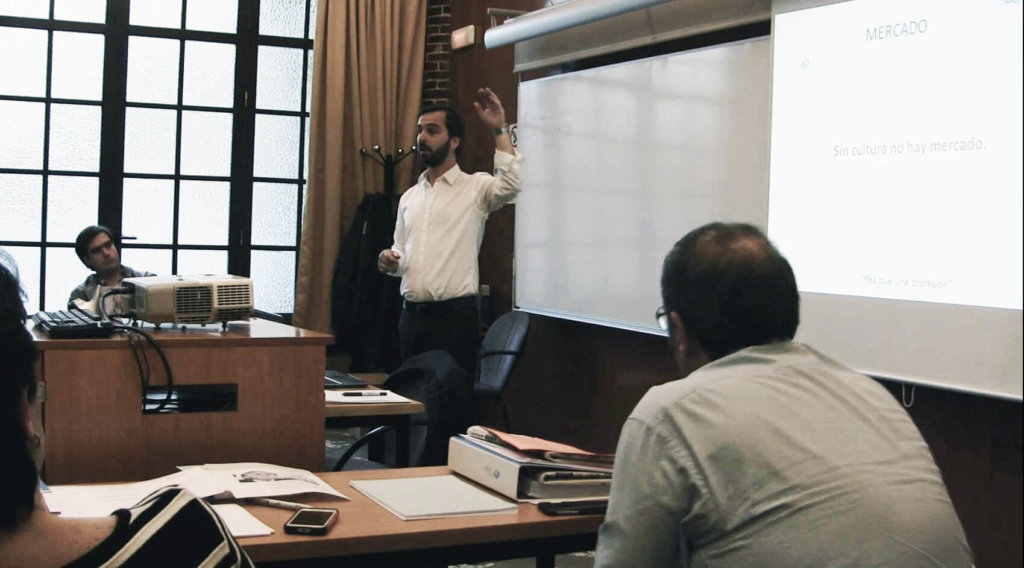Interview with Boris Matijas, Archipielago
Five years ago, journalist, writer and family business expert, Boris Matijas, founded Archipielago, a learning platform for family businesses in Spain and Latin America. Matijas developed a passion for family businesses and successfully embarked on this entrepreneurial venture after previously reporting on and working with renowned family business foundations and associations in both Spain and Mexico. Today Archipielago is one of the largest Spanish-language resources on family business content and best practice.
Tharawat spoke with Matijas about the vision of his organisation, how storytelling allows for greater cohesion and the reasons why family businesses are great role models.
Why did you found Archipielago?
After having executive roles in many different family business associations and foundations, I wanted to do something on my own. A passionate group of us decided to create Archipielago, a network of family business related organisations and associations. We provide them with our services, which focus on three main activities:
Providing families with comprehensive access to academic research. We offer institutions tailor-made solutions on how to translate and make their theoretical and academic knowledge accessible to a wider audience. For example, we helped the Family Business Chair at IESE, a major business school in Spain, build an entire video library with information relevant to family business owners and experts. At the same time, we also worked with ESADE, another top European business school, helping to edit its first family business newsletter. In these tasks we employed all sorts of media like podcasts, articles and videos, to make the academic knowledge comprehensible.
Telling the stories of family businesses. Our experiences convinced us that the cohesion of a family business is directly related to the pride it takes in its history. We feel proud businesses have a strong incentive to continue transmitting their legacy to the next generation. That’s why we were among the first to have started writing books, producing videos and even illustrating comics for families. The entire process of collecting individual experiences into one story takes a few months. In that time, through narrative processes many families make new discoveries about their legacies, which can be an immensely positive experience, for the entire family business.
Providing education for managers, consultants and advisors. We offer tailor-made modules to update practitioners. The idea is to share and spread the best management and government practices that can be learnt from family businesses. This year Archipielago will start providing special training events in which we will share tactics employed by successful family businesses with non-family owned institutions and organisations.
Why is the conversation around family businesses becoming so increasingly important?
The economic crisis we witnessed over the past few years is also a moral crisis. After seeing economies collapse due to the unethical short-term financial instruments based growth, focus has shifted back to the real economy, and in the real economy you mostly find family businesses.
There are important lessons to be learnt from family businesses. The stigma used to be that family owned companies are unprofessional, nepotistic and avoid risk, but we know that this is not true. Their strategies can easily be learnt and transferred to other companies. As a result, we are starting programs that teach family businesses best practices outside the family business field.
The knowledge field itself has recently experienced a boom. Regions like Latin America have started demanding quality content, training, education and consulting for family businesses, which has considerably widened our perspectives.
Education is becoming more and more valued and at the same time more and more accessible. We are living in a time in which information is a major resource. That is why without education there can’t be growth. The demand is huge which is also dangerous. Today there are organisations in almost every country that offer family business programs. Increasing competition in education places more and more pressure on institutions to attract clients, offering more competitive prices, but institutions are struggling to finance themselves and offer good quality programs.
In Spain, we are at a crossroads in that respect. For over six years, many qualified and talented youth have left the country in search of better opportunities. If our companies do not invest in bringing this talent back, we will face a lot of problems in the near future. Family businesses will have to solve these issues.
[ms-protect-content id=”4069, 4129″]
What do family businesses today prioritise?
Family businesses must focus on fostering social capital, which will enable them to weather storms, like economic downturns, and also hand the reigns over to the next generation. The path is long, but it is paramount to keep the family together.
Families have had to make difficult decisions due to the economic crisis. In Spain, companiesan> that laid people off were the first to close. Families that understood the crisis was temporary and as such will pass, were the businesses that reorganised and thrived. They were at an advantage because they could draw on the wisdom of previous generations that had also been through their share of calamities. Knowing that everything is temporary adds to your resilience, as does a long-term view of success and the ability to interpret adversity positively.
Are we finally bridging the gap between knowledge and practice in the family business field?
Yes! More and more! It is an exciting time for the field! There is an increasing body of relevant information reaching familiespan> in a practical format. We are also currently facing a slow but steady shift away from traditional family business> theories like the three circle model. The field is moving more towards individual realisation within the family business ecosystem. Life cycles, personal choices and expectations are now put on the table to be discussed with everyone forming the family business. It is more an approach from the individual point of view, towards cohesion and unity.
Today, social dynamics are shifting in a way that makes it difficult to determine what is family and what is business. What just some 20 years ago we understood as a solid and common family model is no longer valid in many countries and societies where different forms and structures have been legally acknowledged as family systems. Similar things happen with businesses where start-ups, spin-offs, incubators, etc. are bridging the gap between the industrial and information era. Systems have changed so much it becomes harder to define what they are. Multidisciplinary approaches are also increasing, with the inclusion of neuroscience, psychology and anthropology leading to new and exciting insights. It is challenging to develop new concepts and models that adapt to the needs of family businesses. The biggest mistake we can make is to create models and then expect families to fit into them. We have to fit the models to the business families’ specific needs and cycles. This should be our goal as educators and professionals.
What does the future of Archipielago look like?
We are so excited we got this far! After five years it feels like we have outlived the period where many fail, as high mortality rate for entrepreneurs indicate. We are proud of our adventures and failures. The next step will be to limit our activities to those that have proven to work and are most relevant. We want to focus more on providing a gateway to the family business experience.
However, we will continue with our mission to promote that everyone in the field should make the rest of society aware of the importance of family-owned enterprises so that society benefits from their insights. It is especially important now when faced with so many environmental challenges, that family businesses make us aware and appreciative of the importance of roots and the community around us.
Tharawat Magazine, Issue 29, 2016
[/ms-protect-content]

